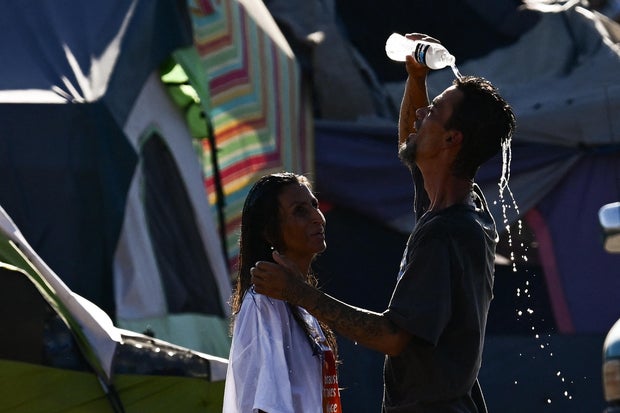It’s always hot in central Arizona, but 2024 is proving to be an endless summer with high temperatures in Phoenix. On Tuesday, the city reached its 100th day with temperatures of at least 100 degrees. That broke the long-standing record of 76 consecutive days set in 1993, according to data from the National Weather Service.
“That’s definitely an interesting number,” said NWS meteorologist Sean Benedict.
The temperature reached 102 F in Phoenix on May 27 and has been in the triple digits every day since. At 2023Phoenix — also known as “America’s hottest big city” — holds the record 31 days in a row of 110-degree weather in July.
Benedict said that the heat in the desert is usually broken by rain, but the rainy season is not abundant. The persistent heat also started early, with triple-digit days already piling up in May.
JIM WATSON/AFP via Getty Images
It doesn’t look like a break is coming.
Unprecedented high temperatures this week in the western US, with extreme heat warnings forecast for Wednesday through Friday in Arizona cities including Phoenix and Lake Havasu City, as well as Las Vegas and other parts of Nevada, including Laughlin and Pahrump.
Public health officials in Arizona’s Maricopa County – where Phoenix is located, the hottest metro area in the US – said as of August 24 there had been 150 heat-related deaths confirmed so far, with another 443 under investigation. Arizona has the only state heat chief. Dr. Eugene Livar saw the rollout of the new extreme heat preparedness plan and used social media to urging people to be careful during hot days and avoid hiking when the temperature is the highest. The Arizona Department of Forestry and Fire Management also issued fire warnings for several counties to reduce the occurrence of wildfires.
There were 645 heat-related deaths last year in the county of about 4.5 million people. The heat has hit the homeless in Phoenix especially hard. The nonprofit group Circle the City, which works in many cities and hospitals and treats about 9,000 people a year, is introducing an IV rehydration program in Phoenix. Nearly half of the 645 people who die of heat in 2023 they don’t have a home.
Pretty much any way the data is parsed, 2024 marks another record-breaking summer in Phoenix. This is the hottest meteorological summer, which includes the months of June, July and August. And the story is the same throughout the western US with several locations in California, Nevada, Arizona, Utah and New Mexico setting records or close to them.
Heat hits the western part of the US
In California, a red flag warning for increased fire risk has been issued. A fire that broke out there and fed by erratic winds knocked out power and prompted an evacuation order for more than 500 residents of a remote forest community near Lake Tahoe. The Bear Fire about 20 miles north of Truckee grew to more than 2 square miles by Tuesday morning, with zero containment.
The California desert communities of Palm Springs, Twentynine Palms, Needles and Barstow will also heat up, with highs of 118 F in Death Valley’s Furnace Creek expected by the end of the week.
Cooling centers are being set up in Los Angeles County, where officials are urging residents to check on neighbors who are elderly, unwell or vulnerable to rising temperatures. “Hot days aren’t just uncomfortable — they can be dangerous,” said LA County Health Officer Muntu Davis. Starting July 3, the city activated the cooling center for 19 days, officials said.
There is no respite from the heat for outdoor vendors. It’s a similar story for many others in the Phoenix area, especially construction workers and landscapers.
PATRICK T. FALLON/AFP via Getty Images
Ramiro Lopez has been doing landscaping in suburban Phoenix for five years and says every summer feels hotter than the last. Between jobs, he rests in an air-conditioned truck to keep the heat at bay, but the past three months have been tough.
“I’ve learned to drink sports drinks and make sure I’m done by 1 p.m.,” Lopez said. “Otherwise, it’s just too much.”
In Phoenix, there have been 37 nights this summer which does not cool below 90 F, another record.
There have also been 54 days of 110-degree temperatures, which is just one day shy of breaking last year’s record of 55 days. That number could be broken this week. The heat is hard on everyone, but it’s especially hard on low-income areas.
“Not being able to cool down at night can affect human health because heat can accumulate in the body,” Arizona State University climatologist Erinanne Saffell wrote in an email response. “People should make sure to stay cool and hydrated.”






